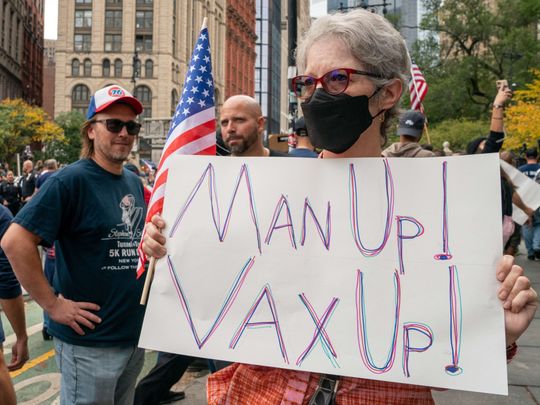
Washington: Apologies to jab, shot and “Fauci ouchie.” Oxford Languages’ 2021 Word of the Year is “vax.”
“Vaccine,” already a common-enough word in English, more than doubled in frequency over the past year, as vaccines against the COVID-19 rolled out. But the jaunty “vax” — a word that has skulked around the margins of the language since it first appeared in the 1980s — surged dramatically, occurring more than 72 times as frequently in September than a year earlier.
“All these other vaccine words increased, but nothing like vax,” said Fiona McPherson, a senior editor for new words at Oxford Languages, which publishes the Oxford English Dictionary.
The Word of the Year is based on usage evidence drawn from Oxford’s continually updated corpus of more than 14.5 billion words, gathered from news sources across the English-speaking world. The selection is meant “to reflect the ethos, mood or preoccupations” of the preceding year, while also having “potential as a term of lasting cultural significance.”
It has traditionally been a scholarly yet often lighthearted effort, highlighting both cultural change and English’s sometimes goofy way of reflecting it. (“Post-truth” and “selfie,” anyone?) But last year, the company forwent a single choice and instead highlighted the pandemic’s sudden and pervasive influence on the language more broadly.
This year, though, it was time to return to crowning a single word. “The word vax, more than any other, has injected itself into the bloodstream of the English language in 2021,” Oxford said in a pun-filled news release.
The word “vaccine” was first recorded in English in 1799, following British scientist Edward Jenner’s experiments with inoculation against smallpox. In early reports on his experiments, the word “vaccine” (derived from the Latin vacca, or cow) was used to refer both to the disease and to the material from the cowpox pustules he injected into his human research subjects.
It was only decades later, according to Oxford’s report on its research, that “vaccine” came to be used for inoculation against other diseases. Curiously, while the shortened form “vax” did not appear until the 1980s, the term “anti-vax” - spelled “anti-vacks” - appeared early.
“The Anti-Vacks are assailing me with all the force they can muster in the newspapers,” Jenner himself wrote in an 1812 letter.








